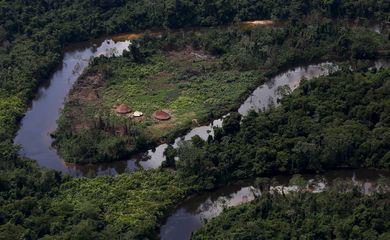Brazil Air Force releases food and medicine to Yanomami Indians

Aircrafts of the Brazilian Air Force (FAB) have been launching daily loads of cargo, the so-called resupply flights, of medical and food supplies to Yanomami indigenous villages in the western part of the state of Roraima.

On board KC-390 and C-105 Amazonas planes, approximately 120,000 loads of food and medicine were delivered to the indigenous communities, including the Surucucu indigenous community, which is home to a Brazilian Army border platoon.
The region is one of the hardest hit by the effects of illegal mining, which has aggravated the indigenous people's illnesses and increased violence.
Agência Brasil reporters watched Thursday (Feb. 2) the launch aboard the KC-390 freighter, which flew over the Surucucu base, in the Yanomami indigenous territory, the largest indigenous area in the country.
According to the Air Force, the supplies are launched from a height of approximately 200 meters and arrive at the 4th Border Platoon (4th PEF - Surucucu), with the help of parachutes installed on the CDS (Container Delivery System), containing the packages of basic food supplies and medicine. In all, the flight takes about two hours, between take-off and landing at the Boa Vista Air Base.
The preparation of the supplies is done jointly by FAB and the Brazilian Army, through the Parachute Folding, Maintenance and Air Supply Battalion (DOMPSA). They carry out all the work of installing the parachutes, which can support up to 227 kilos, as well as collecting the material on the ground.
Illegal mining
During the trip, it was possible to observe the existence of illegal mining traces in the indigenous territory. Deforested areas and lagoons formed by mining operations compete with the vastness of the preserved forest. The coloring of some rivers, with a strong shade of brown, denounces the action of mining, when compared with other waterways of a darker and more natural color.
FAB activated on Wednesday (1) the Air Defense Identification Zone (ZIDA) over the airspace of the Yanomami territory, in Roraima, based on the decree signed by President Luiz Inácio Lula da Silva. To fulfill this mission, three airspace control areas have been created in the locality.
Unidentified or unauthorized aircraft moving through a certain part of the airspace may be intercepted and will be subject to the application of Airspace Policing Measures (MPEA), which include requests for a change of route and even warning and arrest shots, which damage the aircraft and force it to make a forced landing. So far, the corporation has not reported any cases of invasion of restricted airspace.







